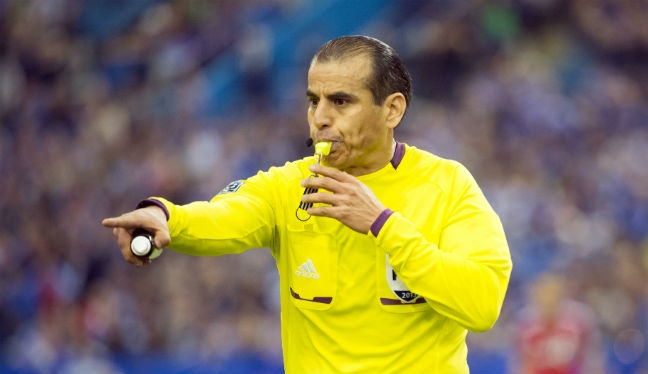Play of the Week 1: Offside – Gaining an Advantage in SKC v NYR

By PRO Training & Development Manager Paul Rejer
PRO’s Play of the Week is back for the 2015 season.
This year’s first Play of the Week is from the MLS opening weekend game between Sporting Kansas City and New York Red Bulls.
It involves Red Bulls forward Bradley Wright-Phillips and Sporting KC’s Ike Opara, as well as PRO center official Baldomero Toledo and AR Fabio Tovar.
At 31:02, Bradley Wright-Phillips was in an offside position when the ball was played to him. SKC’s defender Ike Opara then moved towards the ball but slipped, and the ball hit him and went to Wright-Phillips, who was signaled offside by AR Fabio Tovar.
This is under ‘Gaining an Advantage’ in the Laws of the Game with the Law stating:
‘Gaining an advantage by being in that position’ means playing a ball that rebounds, is deflected or is played to him from a deliberate save by an opponent having been in an offside position.
A player in an offside position receiving the ball from an opponent, who deliberately plays the ball (except from a deliberate save), is not considered to have gained an advantage.
Prior to 2012/13 when this clarification was introduced into FIFA’s Laws of the Game, judging ‘Gaining an Advantage’ was clear and easy to interpret by match officials.
Then, defenders had to clearly have the ball under their control to be interpreted as deliberately playing the ball. However, now, it is a gray area as it is subjective and more difficult to interpret the difference between a ‘deliberate play’ and a ‘deflection’.
With regards to video four from ‘Gaining an Advantage’, when this is discussed there is always a debate as to whether this is deliberate or a deflection. There is certainly a fine line between the two.
This week’s POTW is a perfect example of how difficult this law is to interpret. The defender deliberately moved towards the ball with the intention of playing it, but slipped in the process, and the ball hit him.
Referee Baldomero Toledo believes that it was a deflection and not a deliberate play, and we sent this clip to FIFA who agreed with the decision.
However, the main learning point from these types of calls is for the referee to make his consideration by using various criteria, taking the following into consideration:
– Distance from the ball
– Speed of the ball
– Is he moving towards the ball?
– Thinking time of the defender
– Is the defender’s movement an action or reaction?
It is crucial that the referee takes these considerations into account – he is often closer to the incident than the AR – and not blindly accept the signal.
In debatable cases like this one, as long as the referee goes through the criteria he has done his job. If he is unsure whether it is deliberate or deflection, I would advise that the referee gives offside as it is not obvious that the defender’s intentions are deliberate and, therefore, must fall into the category of a deflection. That is exactly what Toledo correctly did on this occasion.
